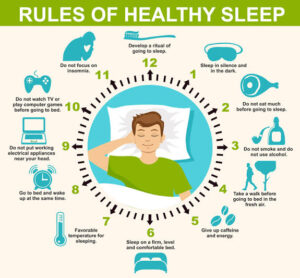In the whirlwind of our daily grind, one essential aspect often overlooked is our sleep. Yet, the significance of a restful night cannot be overstated. Poor sleep not only leaves us groggy but also poses long-term health risks. Let’s delve into the realm of sleep hygiene and uncover simple yet effective tips for achieving rejuvenating rest.

- Maintain a Regular Sleep Schedule
Consistency is key to a well-rested body. Strive to retire and rise at the same time daily, fostering a balanced internal clock conducive to natural sleep cycles.
- Craft a Tranquil Sleep Sanctuary
Transform your bedroom into a serene oasis. Invest in quality bedding, dim the lights, and ensure a comfortable temperature. Consider employing aids like blackout curtains and white noise machines for added tranquility.
- Limit Screen Exposure Before Bedtime
Bid adieu to screens before bedtime to mitigate the disruptive effects of blue light on melatonin production. Engage in screen-free activities like reading or gentle stretching to ease into slumber.
- Mindful Eating for Better Sleep
Monitor your intake close to bedtime, steering clear of heavy meals, caffeine, and alcohol. Opt for light snacks if hunger strikes, aiming for balance and moderation.
- Embrace Relaxation Rituals
Establish a pre-sleep routine to unwind and signal your body for rest. Whether it’s reading, practicing gentle stretches, or indulging in a soothing bath, find solace in activities that calm your mind.
- Prioritize Physical Activity
Regular exercise promotes deeper, more restorative sleep. Incorporate moderate physical activity into your daily regimen, but conclude your workout a few hours before bedtime to allow for relaxation.
- Tame Stress and Anxiety
Combat the sleep-disrupting effects of stress with relaxation techniques like meditation, deep breathing, or journaling. Cultivate a serene mental landscape conducive to restful slumber.
- Nap Wisely
While short naps can revitalize, lengthy siestas or erratic napping patterns may interfere with nighttime rest. Opt for brief, early-day naps to avoid encroaching on nocturnal sleep quality.
- Bask in Daylight
Expose yourself to natural sunlight, particularly in the morning, to regulate your body’s internal clock. Aim for at least 30 minutes of daylight exposure daily to bolster sleep-wake rhythms.
- Seek Professional Guidance if Needed
Persistent sleep disturbances warrant professional attention. Consult a healthcare expert to uncover underlying issues and receive tailored interventions for optimal sleep health.
In Conclusion:
Quality sleep is a cornerstone of overall well-being. By integrating these straightforward tips into your nightly routine, you pave the path to restful and invigorating slumber. Prioritize your sleep, and you’ll awaken refreshed and ready to embrace each day with renewed vitality.

